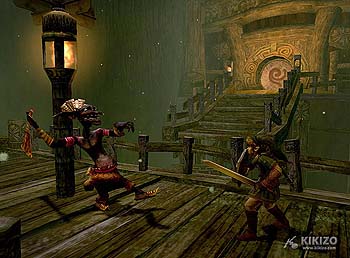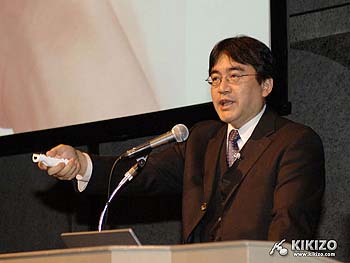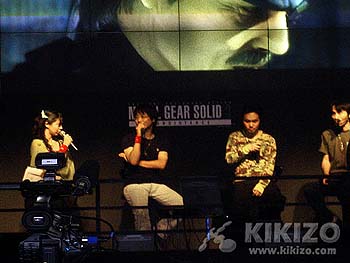Kikizo Games' 2005 Review
The death of Acclaim, suspicious EA activity, Ballmer and Iwata up the next-gen ante, murder by PlayStation, trade shows in London, Tokyo and more in our look at Q3.
Page 3
July: As the summer rolled on and the game releases slowed, a fresh batch of bad publicity was to hit the world of games. While creating Grand Theft Auto: San Andreas, Rockstar had coded in sex-based mini-games. These were locked away, but intrepid hackers managed to create a mod that would let you play the sequences.
Rockstar immediately said that it had nothing to do with it, but after it became clear that the same code was in the console versions it was forced to come clean. The company was strong-armed into having the game re-rated as Adults Only, and sales were stopped until a sanitised version could be created.
Sony's increasingly outspoken boss, Ken Kutaragi, talked PlayStation 3 in July, specifically about the not-due-till-2006 console's pricing. Apparently the raw power of the system and the costly custom chips mean that you'll be paying more than you're used to for the console. How much more isn't known, but Kutaragi did suggest that those interested in the machine should consider working a few extra hours to afford it...
Meanwhile, Microsoft was experiencing turbulence, especially in Japan, where a survey showed people weren't that interested in the Xbox 360 even as the company was ramping up Japanese developer support. The latest games secured included heavy hitters such as Resident Evil 5, but Capcom reiterated that its flagship zombie game would be coming to PlayStation 3 too (and not to Revolution).
![]()
August: As the days got longer and Ashes-induced cricket fever began its spread, game publishers with well-timed releases cashed in. Hitting legend Brian Lara's self-titled game was by far the most popular of the bunch, seeing off EA's pretender with ease.
Considerably more difficult was Sony's losing battle with so-called grey importers of the PSP. Even though the portable's release was only weeks away at the time, the company insisted on siccing its lawyers on anyone brazen enough to import one. After all, what better way to make someone love your product than to sue those making the most effort to get one? Great work, guys .
Meanwhile, over in the US, analysts were weighing in on the Xbox 360, giving their guesstimates for pricing, launch date and availability. Already there were warning signs that Microsoft would not be able to cope with demand, with things looking especially grim for Europe.
Looming shortages were bedevilling the launch of the PSP too. Even with a preposterous six-month gap between the US and European launches, it was starting to look likely that Sony would fail to satisfy demand for its portable.
The company also started to take action against the growing homebrew and emulation scene on the PSP. These clever tech-heads had found holes in the portable's firmware and used it to run home-coded games and also emulators that could run games of yore. Sony's answer then (as it is today) was to enter a vicious circle of updating the firmware only to have it cracked again weeks later.
Not to be forgotten, Nintendo got much needed press in August, but for all the wrong reasons. The company revealed that it was going to hold back Legend Of Zelda: Twilight Princess until 2006 - supposedly to add new elements. The company continues to deny that the game will become a Revolution title instead.
Later in the month Microsoft dropped its biggest bombshell of the summer. The company revealed that contrary to what it had said in interviews just three months earlier it would be releasing two versions of the Xbox 360 - one with a hard drive and one without. Instantly there was a massive backlash, most notably because gamers were upset that developer would now have to scale back their plans to make their games run on the hard drive-less model.
![]()
September: After months of delays and a frankly rather unsettling litigious streak, Sony finally relented and released the PSP in Europe. Huge lines snaked along Oxford Street in the English capital as thousands jumped blindly into the next generation of portable gaming. The launch went smoothly - no surprise considering Sony had half a year to plan it - but there was a nagging lack of hardware.
'Sold out' was a term many people had to get used to as despite the months of preparation, Sony still failed to meet demand. And no wonder. With 185,000 sales in its first few days, the portable became the fastest selling games system ever in the UK.
September is usually a big month for games, especially in Japan, which plays host to the annual Tokyo Game Show. The run-up to this year's even saw several big announcements, including a new Shenmue-like game from Sega called Ryu Ga Gotoku.
This year's TGS was most notable for one thing: the Revolution controller. After months of speculation that the enigmatic device would resemble everything from a virtual-reality helmet to a one-button dumb-stick, the true controller turned out to be much more interesting.
In a packed meeting room off the show floor, Nintendo president Satoru Iwata introduced to the world the TV remote-style Revolution controller. The unit uses a sophisticated motion sensing system that will translate real movements into in-game actions.
Despite the unveiling, Nintendo still refused to show any games running on the system, though hands-on reports from those lucky enough to play with it point to a universally enjoyable controller that should change how you think of games. Exactly what Nintendo was hoping for, in other words.
Sony had promised to bring playable PlayStation 3 games to the show, but these never materialized. That left Metal Gear Solid 4: Guns Of The Patriots to carry Sony's banner - a job it did with aplomb. The trailer for Snake's latest adventure drew massive crowds and had everyone on the floor talking. A bit like the various MGS2 and MGS3 trailers, really.












 Satoru Iwata Video Interview - the late Nintendo president spoke with Kikizo in 2004 as 'Nintendo Revolution' loomed.
Satoru Iwata Video Interview - the late Nintendo president spoke with Kikizo in 2004 as 'Nintendo Revolution' loomed. Kaz Hirai Video Interview - the first of Kikizo's interviews with the man who went on to become global head of Sony.
Kaz Hirai Video Interview - the first of Kikizo's interviews with the man who went on to become global head of Sony. Ed Fries Video Interview - one of Xbox's founders discusses an epic journey from Excel to Xbox.
Ed Fries Video Interview - one of Xbox's founders discusses an epic journey from Excel to Xbox. Yu Suzuki, the Kikizo Interview - we spend time with one of gaming's most revered creators.
Yu Suzuki, the Kikizo Interview - we spend time with one of gaming's most revered creators. Tetris - The Making of an Icon: Alexey Pajitnov and Henk Rogers reveal the fascinating story behind Tetris
Tetris - The Making of an Icon: Alexey Pajitnov and Henk Rogers reveal the fascinating story behind Tetris Rare founders, Chris and Tim Stamper - their only interview? Genuinely 'rare' sit down with founders of the legendary studio.
Rare founders, Chris and Tim Stamper - their only interview? Genuinely 'rare' sit down with founders of the legendary studio. The History of First-Person Shooters - a retrospective, from Maze War to Modern Warfare
The History of First-Person Shooters - a retrospective, from Maze War to Modern Warfare